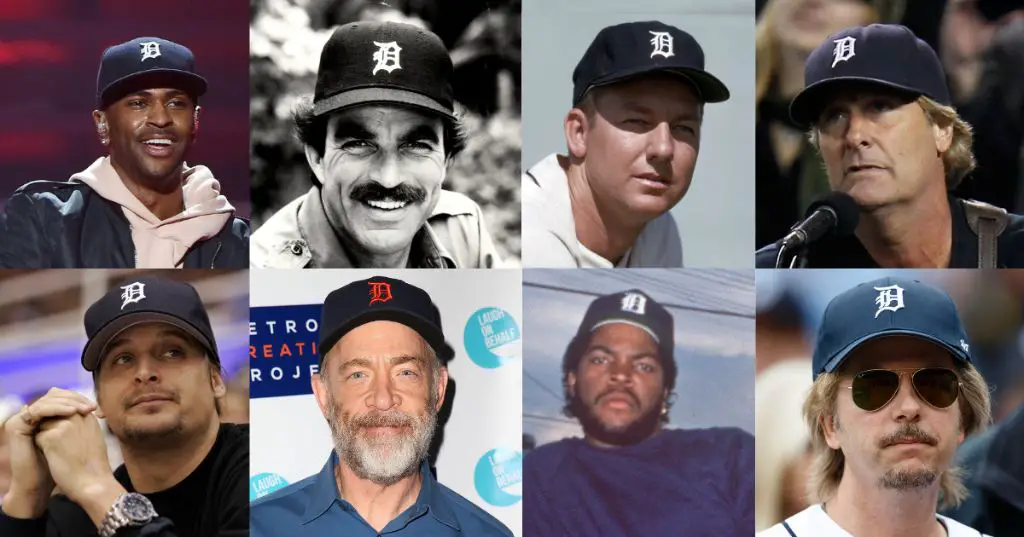Is The Old English D Copyrighted?
The Old English “D” is the iconic logo of the Detroit Tigers baseball team. First appearing on the team’s uniforms in 1904, it has remained a mainstay for over a century, becoming one of the most recognizable logos in American sports.
The Tigers adopted the stylized “D” early in their franchise history to represent Detroit. Since then, it has come to symbolize the team’s rich history and traditions. The classic logo features an Old English calligraphic font, with the “D” drawn in navy blue against a white or grey background on the Tigers’ home and away uniforms.
Over the decades, the logo has undergone minor tweaks and updates in terms of font, color, and style, but has largely retained its classic look and feel. It remains not only a trademark of the Detroit Tigers, but also a beloved emblem of the city of Detroit and its sports culture.
History of the Logo
According to a report by MLB.com, the Old English D logo was first used by the Detroit Wolverines baseball club in the 1880s. The Wolverines played in the National League from 1881 to 1888. The stylized Old English D is believed to have been designed by one of the team’s owners, Frederick Stearns.
After the Wolverines disbanded in 1888, there was no Major League Baseball team in Detroit until the Detroit Tigers joined the American League as a charter franchise in 1901. The Tigers adopted the Old English D logo, reviving the iconic symbol from Detroit’s early baseball history. It has remained their primary logo for over 100 years.
According to baseball historian Todd Radom, the first known printed use of the phrase “Old English D” appeared in the Detroit Free Press newspaper in 1896. Radom notes that the logo has been known as the Old English D pretty much ever since it was created in the 1880s.
Legal Protection
The Old English D logo was registered as a trademark by the Detroit Tigers baseball club in 2017. According to the trademark registration, the mark covers apparel items like t-shirts and hats featuring the stylized Old English D design. This provides the Tigers with legal protection over unauthorized commercial use of the logo. However, the trademark does not prevent fans from using variations of the D logo for personal or editorial purposes. The registration helps the Tigers control licensing and prevent counterfeit merchandise. Overall, it recognizes the logo’s strong association with the team and status as an iconic symbol for Detroit Tigers fans.
Usage Rights
The Old English D logo is trademarked by the Detroit Tigers baseball team, which means they have exclusive rights to use and license the logo commercially. However, individuals can make limited non-commercial use of the logo without violating trademark law.
According to legal experts, individuals can legally use the Old English D logo for personal use, such as on homemade t-shirts, hats, or other items for personal wear. As long as the items are not being mass produced or sold for profit, personal use is allowed under fair use exceptions to trademark law (Source: https://www.quora.com/If-I-modify-the-old-English-D-before-using-it-on-a-shirt-would-it-still-be-considered-illegal-In-detroit-the-tigers-have-trademarked-the-letter-d-in-typefont-old-English-I-want-to-use-the-d-but-modify-it-with-drips).
However, commercial use of the exact Old English D logo would require licensing from the Detroit Tigers. Any products like t-shirts, hats, posters, or other merchandise using the logo that are mass-produced for sale would need explicit permission from the team. The team actively protects its trademark rights and issues cease and desist letters to unauthorized commercial uses of the logo (Source: https://www.rodbuilding.org/read.php?2,100477).
Notable Trademark Disputes
While the Old English D logo is closely associated with the Detroit Tigers baseball team, it remains the team’s registered trademark. The team has vigorously defended its trademark rights against unauthorized uses of the logo over the years.
In 2005, the Tigers sued an individual selling merchandise featuring the Old English D logo without permission. The merchandise included t-shirts, jackets, and other apparel items. The Tigers argued this constituted trademark infringement and dilution of their brand. The judge agreed, issuing an injunction against the seller and requiring them to turn over all infringing merchandise to the Tigers.
More recently in 2018, the Tigers sent a cease and desist letter to Freeport Brewing Company over their “D-Town Brown” beer logo. The Tigers claimed the brewery’s stylized D logo too closely resembled their trademarked Old English D mark. While Freeport initially fought back, they eventually agreed to phase out use of the D-Town Brown branding to avoid a legal battle.
These cases demonstrate how aggressive the Tigers have been in defending their ownership of the classic Old English D logo. While the logo has taken on cultural significance in Detroit, legally it remains the protected intellectual property of the baseball franchise.
Cultural Significance

The Old English D logo holds deep cultural significance for Detroiters and Tigers fans. It has become a unifying symbol of the city’s identity, representing its rich baseball history as well as the fighting spirit of Detroiters. Many fans wear hats or shirts adorned with the iconic logo as a badge of hometown pride (https://www.reddit.com/r/Detroit/comments/12exvxe/how_did_the_old_english_d_go_beyond_a_baseball/).
According to the Audacy article, the logo is an integral part of Detroit’s culture, immortalized in tattoos, paintings, and landmarks around the city. It exemplifies the city’s resilience through challenging economic times. The Old English D logo is a rallying image for Detroiters, connecting generations of fans through their shared love of the Tigers (https://www.audacy.com/wwjnewsradio/news/local/how-the-old-english-d-became-detroits-most-iconic-logo).
Beyond baseball fandom, the logo represents Detroit’s spirit, creativity, and loyalty to tradition. It has become ingrained in the city’s identity and serves as a source of hometown pride. The classic logo endures as a symbol of Detroit’s past glory and future potential.
Licensed Merchandise
The Old English D logo is one of the most iconic and recognizable logos in baseball. As such, the Detroit Tigers franchise has capitalized on its popularity by licensing the logo for use on various merchandise items. Some of the most common types of licensed D-branded merchandise include:
Apparel – T-shirts, hats, jackets, jerseys, and other clothing items featuring the Old English D logo are hugely popular among Tigers fans and baseball enthusiasts in general. The logo looks great when emblazoned on apparel items.
Accessories – Items like mugs, keychains, pens, buttons, and more allow fans to showcase their Tigers pride on a daily basis. These smaller accessories are easy to brand with the classic Old English D.
Collectibles – For diehard Tigers fans, collectibles like artwork, commemorative coins, and figurines featuring the Old English D tap into their passion for the team history and nostalgia. These types of collector’s items are popular with long-time fans.
Novelties – Fun novelty items like bobbleheads, decals, puzzles, playing cards, and more allow fans to enjoy the Old English D logo in new ways. These novelty items often feature creative variations on the classic logo.
By licensing the Old English D for branded merchandise, the Tigers generate significant revenue while also promoting their iconic brand to new generations of fans.
Parodies and Homages
The Old English D logo has become so iconic that it has inspired many parodies and homages in pop culture over the years. Some notable examples include:
In music, the rap group Insane Clown Posse referenced the logo in multiple songs, replacing the D with a P to stand for “Psychopathic Records.” Rock bands like The White Stripes and Big Chief have also incorporated the D logo into their own artwork and merchandising as a nod to their Detroit roots.
On television, the logo has been parodied on shows like The Simpsons and Saturday Night Live. In a famous SNL skit from 1986, Joe Piscopo plays a radical Detroit Tigers fan who sports the D logo tattooed on his forehead.
Visual artists like Shepard Fairey have also put their own spin on the Old English D, using it in street art and apparel designs. The logo’s bold, gothic look makes it versatile for artistic reinterpretations and stylistic homages.
Beyond direct artistic usages, the Old English D serves as a iconic visual shorthand for Detroit and its heritage. It frequently appears in films, commercials, and other media seeking to represent the city and its connections to baseball, manufacturing, and working-class culture.[1]
Future Outlook
The Old English D logo is likely to remain highly relevant and protected for the Detroit Tigers franchise going forward. As one of the most classic and recognizable logos in sports, the Old English D retains strong cultural cache and brand identity for the Tigers.
The Tigers continue to hold the registered trademark for the Old English D, making it unlikely the logo will fall into the public domain any time soon. Barring an unexpected legal challenge, the Tigers should have no issue maintaining exclusive rights to the logo for the foreseeable future.
While the Tigers have occasionally experimented with logo variations, the core Old English D design has changed little over the decades. This consistency has only added to the logo’s iconic status. As fans on Reddit discuss, the logo retains appeal across generations of Tigers enthusiasts.
With such a strong tradition and legal protection around the Old English D brand, the logo seems poised to remain a cultural touchstone for both the Tigers franchise and Detroit for many years to come.
Conclusion
The history of the Old English D logo shows how an iconic sports symbol can take on a life of its own. While the Detroit Tigers hold the trademark rights to the official logo, variants of it have become ingrained in American culture. The D represents not just a baseball team, but the spirit and pride of the Motor City itself.
Key points covered include:
- The Old English D was created in 1904 and has been in continuous use ever since.
- As an active trademark, the Tigers have a legal right to limit its usage, but allow a good deal of public use.
- Challenging unauthorized usages requires continual oversight by the Tigers.
- The iconic logo has developed a nostalgic appeal, appearing on merchandise and tributes.
- Future disputes over Old English D merchandise and promotions will likely arise.
In the end, the widespread goodwill towards the classic logo allows it to be shared by fans while still maintaining its association with the Detroit Tigers.

